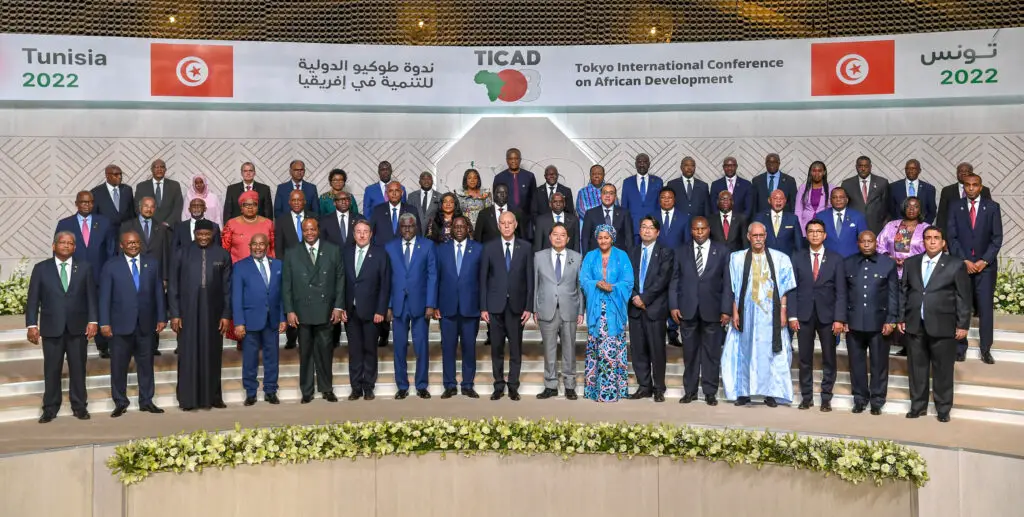The Tunis Declaration was adopted this year at the Eighth Tokyo International Conference on African Development (TICAD 8), which held major business sideline meetings with Japan International Cooperation Agency (JICA) and Japan External Trade Organization (JETRO).
TICAD 8 was held in the Tunisian capital of Tunis on August 27 to 28 and was attended by 48 African nations led by Tunisia President Kais Saied and Macky Sall, President of the Republic of Senegal / Chairperson of the African Union (AU).
Along with the Tunis Declaration, “Japan’s Contributions for Africa,” consisting of some 70 parts, was announced by the Japanese government led by Prime Minister Kishida Fumio, who participated online from Japan and Foreign Minister Hayashi Yoshimasa who attended in person.
TICAD 8 had two major outcomes, let us review these two developments and what they mean for Africa, first, lets have a look at the Tunis Declaration.
- TICAD 8 adopted the Tunis Declaration that consists of US$ 30 billion to be issued over three years
- Japan to support human resources development in Africa with training of 300,000 African professionals
- Japan opens a support desk to assist Japanese companies expansion in Africa and vice versa
TICAD 8 Tunis Declaration
The Tunis Declaration consists of three pillars: 1) Economy: Realizing a structural transformation for sustainable economic growth and social development; 2) Society: Realizing a resilient and sustainable society; and 3) Peace and stability: Realizing sustainable peace and stability.
In his opening speech, Prime Minister Kishida Fumio emphasized the importance of “investment in people” and said rather than an aid donor, Japan is a partner looking to grow together with Africa. Japan announced a US$ 30 billion to be issued over the next three years that is meant to support both public and private sectors in Africa as well as commitment to.
“Africa is a young and hopeful continent that can expect dynamic growth. Japan wants to be a partner that grows together with Africa,” the PM declared and cited Japan International Cooperation Agency (JICA) commitment to this end.
“It is my hope that, through a virtuous cycle of growth and distribution, Japan will help realize a resilient Africa that Africa itself aims to achieve,” he said.
He explained that the pledged US$30 billion will go to green growth, health, human resource development, regional stabilization, and food security.
To help Africa address these challenges, JICA has undertaken several initiatives; the first is the ABE Initiative (African Business Education Initiative for youth) that is meant to build human resource. JICA also supports Project NINJA (Next Innovation with Japan) to boost innovation and JICA is also behind FinTech support through Private Sector Investment Finance.
Next Innovation with Japan (NINJA) is an incubator program designed to support startups and help them to accelerate their potential. The initiative is undertaken by JICA and is meant to promote entrepreneurship, innovation and the creation of new businesses in developing economies.
Through such initiatives, Japan is supporting Africa’s sustainable development in a clean, green, climate smart approach. With a focus on youth and innovation,Japanis helpingmodel Africa’s future in a partnership
Japan Prime Minister Fumio, also announced human resource development pledging capacity building through training of 300,000 African professionals in industries as diverse as health, education, justice, administration and Africa food security.
Also in attendance were Japan International Cooperation Agency (JICA) President Tanaka and Senior Vice President Nakamura Toshiyuki. The two leaders led a business forum organized by the Japan External Trade Organization (JETRO) where private sector support was again emphasized as key to ‘overcoming the compound crises facing Africa.’
The business forum that was held on the sidelines of TICAD8 was attended by over 500 business representatives, with over 100 Japanese firms and hundreds of African businesses. To describe it all Japan Prime Minister Fumio said TICAD 8 has served to bring Japan and Africa together like never before.
Also Read: Will digital agriculture bring economic development to Africa?
JETRO led business forum, 90 MoUs signed
“With the increasing international importance of Africa’s development, contact between business and development is becoming increasingly frequent,” said the Japan External Trade Organization (JETRO), CEO Sasaki Nobuhiko.
In the wake of the global economic slowdown, JETRO has opened a support desk to assist Japanese companies expansion in Africa and also helping African firms enter the Japan market, JETRO CEO Sasaki said.
The forum highlighted the importance of supporting startups, emphasis on green investment, development of human resources and Africa food security.
Through the JETRO forum, the Japanese business community launched an investment fund for startups in Africa valued at over 10 billion yen.
JETRO CEO Sasaki said the forum also catapulted launch of the Green Growth Initiative with Africa valued at 4 billion dollars that will finance public and private cooperation ‘toward a structural transformation to achieving net zero.’
Thanks to the JETRO led forum, more than 90 memoranda of understanding (MOUs) were signed to develop human resources and enable technology transfer including agriculture technology for Africa food security.
Japan food security initiatives for Africa
In the wake of the pandemic, African countries are contending to soaring food and energy prices worsened by the Russia-Ukraine war.
“The question is, Japan can be a friend in difficult times?” JETRO CEO Sasaki rightfully queried.
Japan seized the opportunity to pledge 300 million dollars to support food production through co-financing with the African Development Bank (AfDB).
In partnership with the AfDB, Japan, through JETRO, intends to provide co-financing of 5 billion dollars and another 1.08 billion dollars will go to the Global Fund to support countermeasures for infectious diseases, CEO Sasaki detailed.
To top it off, Japan now wants to appoint a Special Envoy for the Horn of Africa to ‘help swiftly respond to the complex challenges facing the region.’ The Japan International Cooperation Agency (JICA) is vital to supporting regional stability in the Horn of Africa and ensure Africa food security.











